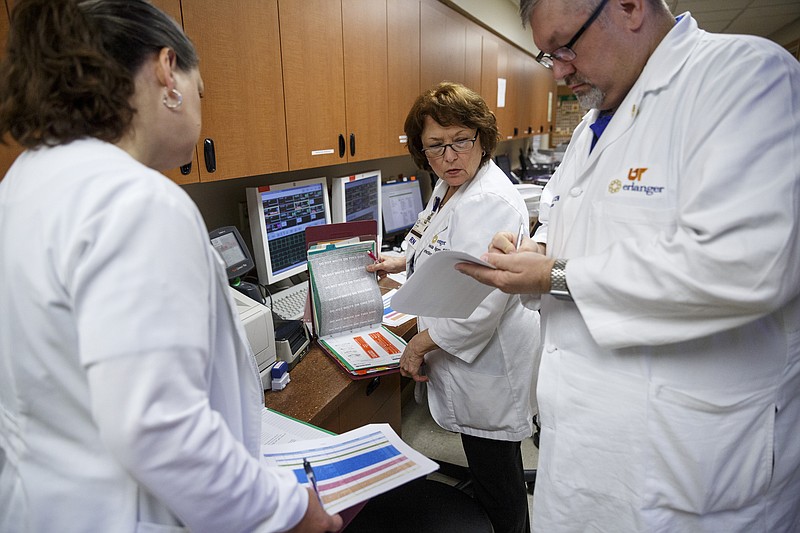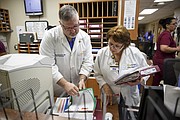Dr. Joe Cofer is angry.
As Erlanger hospital's chief quality officer, Cofer is responsible for ensuring the care patients get is as good as possible, and he is not happy about a recent report that suggests he - and his counterparts at hospitals across the U.S. - are not doing a good job.
A team of patient safety experts led by Dr. Martin Makary at Johns Hopkins University Hospital made headlines last month when it published a study concluding that medical errors were the third-leading cause of death in the U.S., behind heart disease and cancer but ahead of everything else.
Makary's study singled out several areas for concern, including a lack of standard procedures for treatment, poor coordination by hospital staff, and fragmented insurance networks.
Read More
Read Dr. Martin Makary’s letter to the Centers for Disease Control about medical error deaths at www.documentcloud.org/documents/2822345-Hopkins-CDC-letter.html
LEADING MEDICAL ERRORS
1. Adverse drug events2. Catheter-associated urinary tract infection3. Central line-associated bloodstream infection4. Injury from falls5. Obstetrical adverse events6. Pressure ulcers (bed sores)7. Surgical site infections8. Venous thrombosis (blood clots)9. Ventilator-associated pneumonia
Cofer disputes Makary's numbers, arguing that the number of deaths from medical error is much lower. But he agrees that what hospitals refer to as "adverse events" happen more than they should.
"I think that paper was in many regards sensational. He made it sensational to make a point, to wake everybody up," said Cofer, who leads a 30-member quality team at Erlanger. "But I don't agree that the numbers are that high."
Part of the reason for arguments over the number of deaths is that when a death certificate is filled out, there is no code for "medical error." Instead, a death might be listed as due to infection, or an adverse drug reaction, with no acknowledgment the problem was caused by sloppy medical care.
While there is debate over the exact number of deaths, doctors concede the problem is real.
"We're trying to develop systems that prevent error. We're a lot better at it than we were 10 years ago," Cofer said. "But I feel very certain [that] because medicine is a human endeavor, we'll never get it perfect."
Hospitals are complex places where thousands of people with every imaginable injury or illness show up, seeking treatment. In Chattanooga alone, more than 700,000 people were treated at Erlanger, CHI Memorial and Parkridge Medical Center last year.
Most of those patients will be seen by multiple hospital staffers, and their proper care may require coordination with dozens more.
There are many opportunities for mistakes.
"A patient comes in with a bullet in the arm, but they also have diabetes, and are suffering from hypertension, and we have to treat that, too," Cofer said.
Getting hospital staffers to admit they made a mistake is the first step toward finding ways to prevent them from occurring in the future, according to Dr. Mark Anderson, medical director for infection prevention at CHI Memorial. That means convincing them they won't be punished if they report an error.
"What's important is having a nonpunitive culture where if something occurs that is not desirable, how do you address the work environment and not the people involved," he said.
One fear was that admitting errors would lead to more lawsuits for medical malpractice. But Anderson said his experience is that doesn't happen that often.
"I think when you look at an analysis of malpractice suits with physicians, the people who get sued the most are the ones who don't communicate very well with their patients," he said. "There are a lot of case reports where terrible mistakes happened, and the doctor and hospital were very forthcoming with the patient, telling them what they did wrong, and there is not a lawsuit."
Poor communication among the medical staff is also a major cause of problems, Anderson said. As an example, he said that if a patient is sent to another area of the hospital for an X-ray, it is important the X-ray staff know whether the patient is capable of getting off a gurney and standing, or needs assistance. If that information isn't available, a patient may fall, a frequent source of hospital injuries.
The failure of staffers to follow proper procedures is also a concern, CHI Memorial Vice President for Quality Melissa Roden said. She has been focusing on patients in critical condition who are bed-bound and at risk of skin sores. "We're making sure that everyone is following the same protocols," she said.
But despite the quality control efforts, problems remain.
Most area hospitals participate in an annual survey done by The Leapfrog Group, a nonprofit organization that promotes patient safety. Leapfrog collects data from hospitals nationwide on some basic procedures that affect patient safety and in other areas.
All three major Chattanooga hospitals - CHI Memorial, Erlanger and Parkridge - received the top ranking for taking steps to reduce harm. That includes a range of issues such as leadership, staff training, and providing correct medication information, as well as efforts to reduce infection, handwashing, and reducing problems with ventilators.
But there are striking differences among Erlanger, CHI Memorial and Parkridge in other areas.
According to the Leapfrog survey, CHI Memorial is your best bet if you need an aortic valve replaced, perhaps because doctors there do a lot more of them, 176 versus only 42 for Parkridge and 38 for Erlanger. Erlanger should be your choice if you need pancreatic resection surgery, while Parkridge does a better job of preventing infection from urinary tract catheters.
You can access the entire survey results, and compare up to three hospitals at a time, at leapfroggroup.org/compare-hospitals.
Both Erlanger's Cofer and Memorial's Anderson believe their efforts to improve patient safety are showing results.
Urinary tract infections have dropped by 80 percent in three years, Cofer said, while central line infections, where a tube is inserted in a patient's veins, are down 60-70 percent. "You set goals for yourself and look at yourself every month and if you find a problem, you have a root cause analysis," Cofer said. "You get the nurses in there, and figure out what could have been done better, or differently."
Erlanger has a system where any hospital employee who believes he or she has seen improper treatment can file a complaint anonymously, Cofer said.
CHI Memorial's Anderson said he has also seen improvements.
"In the past three and a half years, we have seen a significant reduction in medical errors across the board," he said.
Patients can also improve their chances of avoiding medical errors.
They should be sure to tell doctors about any medical problem they are experiencing - even if it is not the one that brought them to the hospital - and provide a list of all the medications they are taking, Cofer said. Ask the doctor to explain his or her diagnosis and treatment plan in a meeting with both patient and family, and ask questions if there is anything that is unclear. And while hospital staff may not always welcome it, patients should ask questions when they don't understand the reasons for any treatment or medication.
Cofer said he also wanted to emphasize that doctors take their mistakes seriously.
"Physicians try very hard not to create harm," he said. "Physicians cry. They don't do it in front of patients, they do it later."
"In my surgical career, I've had bad surgical outcomes," he said. "I remember every one of them."
Contact staff writer Steve Johnson at 423-757-6673, sjohnson@timesfreepress.com, on Twitter @stevejohnsonTFP, and on Facebook, www.facebook.com/noogahealth.

